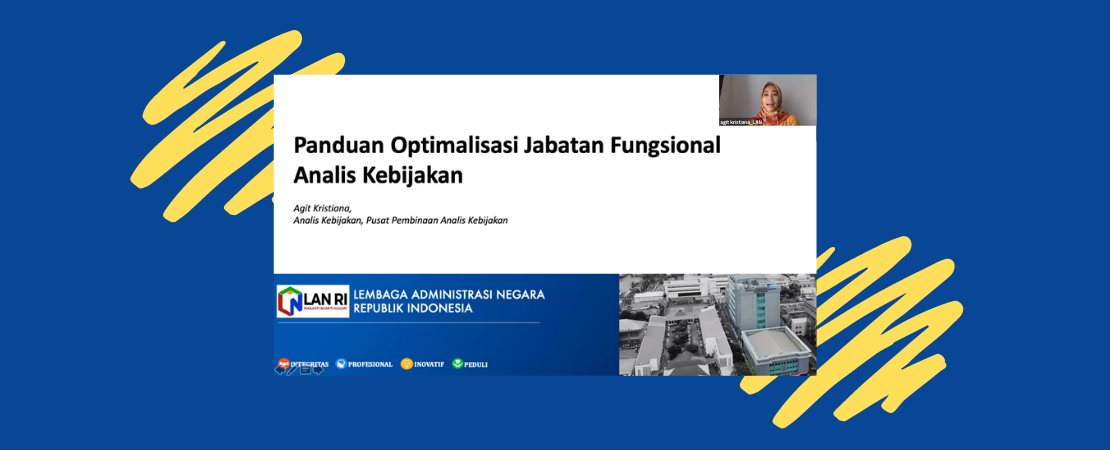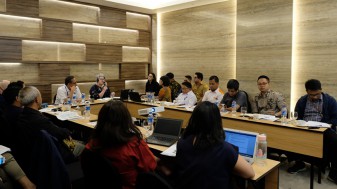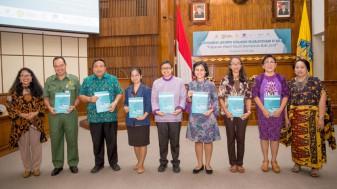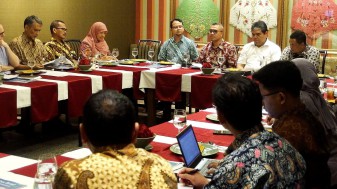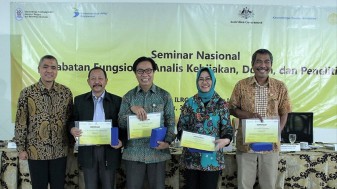The Policy Analyst Functional Position or JFAK works to support quality evidence-based policymaking. The purpose of this new position needs to be consistently disseminated so that its presence can be optimised by policymakers.
The optimisation the JFAK was discussed in the ‘Dissemination of Policy Analyst Functional Position Guideline’ event, conducted online on Friday 9 July, moderated by the Head of the Policy Analyst Communication Forum of South Sulawesi Province, Alham Syahruna. The event presented a number of speakers, including the Head of the Local Civil Service Agency (BKD) of South Sulawesi (Sulsel) Province, Imran Jausi; Junior Expert Policy Analyst from the Policy Analyst Development Centre of the National Public Administration Institution (LAN) of the Republic of Indonesia, Agit Kristiana; and the Secretary of the Policy Analyst Forum of South Sulawesi Province, Yvonne Salindeho. The event was organised through collaboration between Yayasan BaKTI, Knowledge Sector Initiative (KSI), LAN, and the South Sulawesi Provincial Government (Pemprov).
The Head of the Local Development Planning, Research, and Development Agency (Bappelitbangda) of Sulsel Province, Darmawan Bintang, stated in his opening remarks that the JFAK is a position established to support leadership in producing accountable policies, adding that ‘this functional position will be the pioneer in analysing and evaluating things that are needed to predict policies by looking at both past and present data’.
In Sulsel, there are 12 Civil Services (ASN) that currently hold the JFAK position, and this number will continue to grow. Mr Bintang pointed out that despite their low number, the work of policy analysts in Sulsel is already visible, for example, in the multi-party cooperation for the assessment of the value chain for silk commodity. Policy analysts play an important role in supporting the assessment activity required in this cooperation. Mr Bintang added that he hopes to see greater dissemination of JFAK’s role in order to increase policy analysts’ capacity to develop and produce input for the policymaking process.
LAN’s Junior Expert Policy Analyst, Agit Kristiana, spoke on the policy analysts’ role in knowledge production and management to produce policy recommendations, policy advocacy, and competency and professional development. This functional position is responsible and has the authority to conduct policy analysis studies at the national and local level. She explained that the responsibilities of the role are inseparably integrated in every stage of the policy cycle from problem identification to policy formulation, implementation and evaluation.
Ms Kristiana stated that since the position was established in 2013, the number of policy analysts across Indonesia had grown to 3,923 by June 2021. Most of them are administrative and structural officials who became policy analysts through the equivalency pathway. Currently, most of the policy analysts are in national ministries/institutions, but the creation of local level policy analysts will be prioritised in the bureaucratic restructuring policy, to commence this year. Once their numbers increase, policy analysts will become able to collaborate more effectively with other functional positions in the policymaking process. The assessment of the value chain for silk commodity in Sulsel is a good example of such collaboration.
Besides going through the equivalency path, Ms Kristiana continued, there is a regular path to becoming a policy analyst, which entails passing a competency test. Unfortunately, at present the space for competency development is limited, and the testing processes is hindered by the limited number of credit score assessor teams.
Ms Kristiana added that a manual has been developed to increase understanding regarding various aspects of the policy analyst role. This is expected to enhance the role of JFAK in their respective organisations. This manual was developed by a team from LAN and the Faculty of Social and Political Science of Gadjah Mada University, supported by KSI. This book is not only intended for policy analysts, but also for supervisors and leaders, so that they can optimise the presence of JFAK. Ms Kristiana explained that ‘[the] manual is not binding, meaning the substance will continue to grow’.
With regard to the presence of JFAK, the Head of BKD South Sulawesi, Imran Jausi, explained that they have proposed a simplified structure of Local Government Agencies (OPD) to the Ministry of Home Affairs. This proposal was conveyed after the legal and administrative agencies at the local level were ready. If approved, the proposal will mean the South Sulawesi Provincial Government will immediately change its structure and working procedure and can move on to the process of inaugurating the functional position.
The Secretary of the Policy Analyst Forum of South Sulawesi Province, Yvonne Salindeho, said that dissemination regarding the presence of JFAK should be further increased to improve understanding of JFAK’s duties, function and requirements. There is currently no credit score assessor team in South Sulawesi, and this needs to be established soon in order to maximise the number of paths open to prospective policy analysts.
Despite their limited number, since 2019, policy analysts in Sulsel have produced a number of products that received appreciation from the leadership and Sulsel’s Local House of Representatives (DPRD). These policy analysts’ work included a policy brief, inputs regarding official scripture procedure, and policy analysis, including the collaborative assessment of silk chain value, which involved elements of the government, academics and civil society. Ms Salindeho concluded that the collaboration revealed many ‘interesting things’ that made them ‘enthusiastic to proceed’ with a greater dissemination of the role.
This ‘Policy Analyst Functional Position Guideline Dissemination’ discussion is expected to increase the understanding of stakeholders within South Sulawesi Province on the role and function of JFAK, thus supporting the optimisation of JFAK’s role for better policymaking.

